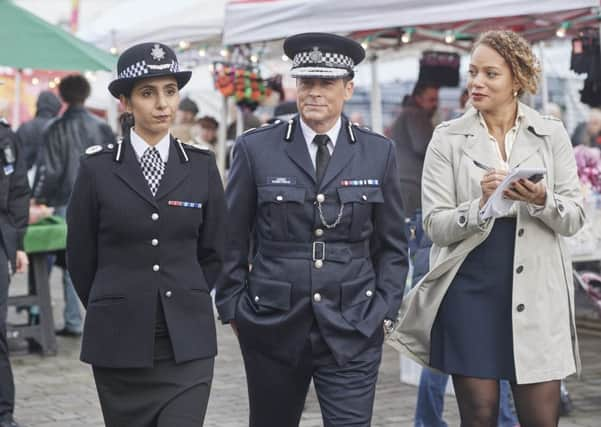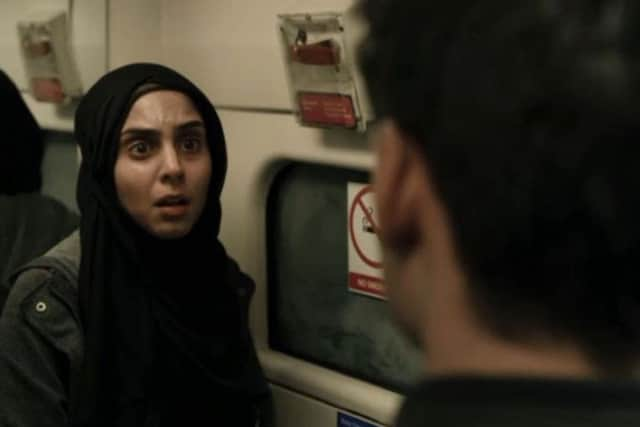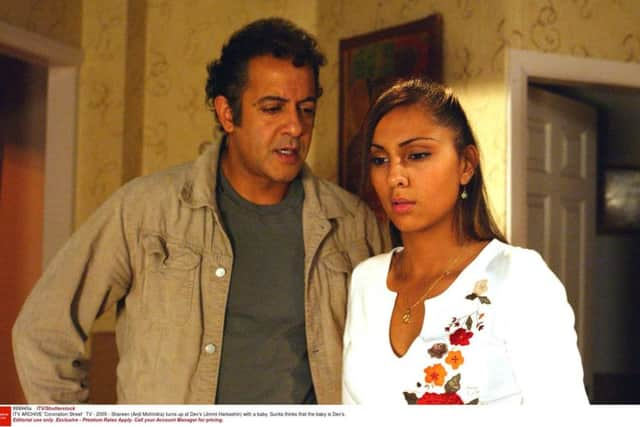Anjli Mohindra interview - from Bodyguard to Wild Bill, she’s on a role


Ask someone to describe Wild Bill and they start using words like ‘offbeat’, ‘dark’ and ‘black comedy’, making comparisons with Fargo and Breaking Bad, then suggesting you just watch it and see for yourself. Starring American Brat Pack actor Rob Lowe, (of St Elmo’s Fire, Wayne’s World, West Wing and Parks and Recreation), the new ITV police drama is set in Boston, Lincolnshire, the most pro-Brexit town in Britain, and kicks off with a severed head in a freezer – see what we mean?
Lowe, possessor of two Screen Actors Guild Awards, six times Golden Globes and a Primetime Emmy nominee, is Bill Hixon, a Miami police chief escaping his past by becoming chief constable of the East Lincolnshire Police Force. He thinks he’s hard bitten and cynical until he meets his new team, completely underwhelmed by their new chief and less than impressed by his US-style credentials, and the scene is set for six hour-long episodes of left-field law-enforcement.
Advertisement
Hide AdAdvertisement
Hide AdAnjli Mohindra, who we last saw as Nadia the suicide bomber in Bodyguard, stars as Lowe’s stab-in-the-back-or-stab-in-the-front-which-way-will-she-go deputy chief constable, Lydia Price, also has a stab at summing up the show.


“It’s quirky ... feels different to usual British TV. I think offbeat is the only way I can describe it. There’s something unique about the characters and the tone. It explores a new kind of TV drama that includes comedy, but it’s the crimes that are a bit weird, gruesome and heightened.
“When I heard Rob Lowe was going to be playing this lead copper and it’s set in a rural place in England, I could see this was going to be a fish out of water story. And what I love about it is that Rob’s character can’t be arsed that people are going to be so excited having an American copper in their town, but what he quickly discovers is that they’re just as cynical and hard to please as he is. So there’s this brilliant tug of war of who gives less of a crap,” she laughs. “And that suddenly sparks the want in him to be better and stick it out.”
While most of the squad are indifferent to Lowe, for Lydia Price he’s the latest in a series of Caucasian males awarded a job she feels is rightfully hers, and her feelings are rather more intense.
“She hates him and everything he stands for, but they have to get along for the sake of the force. Their love/hate relationship is so much fun to play. Being mean to Rob Lowe is such a cool thing to be able to do, because he’s amazing. It’s quite nice to have a part where you get to stick it to ‘em,” she laughs.


Despite being set in a town where 75.6 per cent of inhabitants voted Leave and with a British Indian deputy chief constable and a substantial migrant community, Wild Bill employs a light touch in its handling of race. So keen young detective Muriel Yeardsley, played by Bronwyn James (The ABC Murders) turns out to be fluent in Polish, and any racism toward the Asian and Eastern European community is in the background.
“I think the way the show says this is the way we are and tells it like it is without judging or having a political attitude is far more powerful than if it were moralising.”
Advertisement
Hide AdAdvertisement
Hide AdAs for Lydia, Mohindra can empathise with her British Asian female experience.
“She’s a brilliant character to play and as a British Asian female there’s definitely a glass ceiling, even being an actor – because the arts feel more progressed – that I find myself up against. So for that narrative to be told is exciting. Lydia is ambitious, tenacious and in every way qualified, experienced and invested in her community. She should be chief constable, but they keep outsourcing the role. She could go somewhere more progressive, but she loves the place and the people so she tries not to let bitterness get in the way of doing a really good job.


“But from the first episode when she and Hixon meet, you know he’s gonna get stabbed by her in some way, the cards are on the table.”
Mohindra credits executive producer Lowe’s versatility and skill in making changes on the hoof for the fast-paced and lean feel of the series. “At first you’re like ‘Oh, you’re gonna change everything?’ but I actually loved that. He has so much experience as an actor I was in awe of his ability to know what would work.”
Born in London to Sandy and Bob Mohindra, the 29-year-old grew up in Nottingham where she attended the Bafta-winning Carlton Junior Television Workshops, breeding ground of young British acting talent. Child roles such as Doctor Who regular Rani led on to playing troubled teens but as her career progressed Mohindra hid her ethnicity to get auditions, compounding a sense of shame over her ‘otherness’, carried from childhood.
According to Mohindra her parents are both Hindu in terms of religion and Punjabi in terms of birth, language and culture. Her father was raised in Kenya when it was a British colony, and her mother arrived in the UK from the Punjab at 18, to further her education.
“They had an arranged marriage, and they’ve been married for, God, I think it’s going to be 35 years. They’ve absolutely made it work, although they are so different from each other. I guess I’ve leaned more towards my dad’s staunch Britishness, but now I want to explore my mum’s side of the world, the culture she brings forward,” she says.
Advertisement
Hide AdAdvertisement
Hide AdWith a father in the army and a mother who was variously a court clerk, bank manager, ran a post office and a pub and taught English, Mohindra and her brother and sister found themselves in an Armed Forces School in Germany, where they were the only ethnic minority kids among 2,000. Back in the UK she developed a deep desire to fit in and admits to wishing she was white, and elbowing her mother if she spoke Punjabi in the supermarket.
“I always felt like I was constantly researching British culture and working out where to bring it into conversations so I could appear to be as British as everybody else,” she says and laughs. “That only really went away in the past couple of years when you realise it’s amazing that you have something else to bring to the table as well as being British.
“Now I feel like I’m trying to catch up and also atone for all the missed opportunities to explore who I was. I think a lot of people feel that, based on whatever it is they feel makes them different. And we’re at a turning point, with millennials on a wave of social media reaching out to others and celebrating being different. If you’ve got something that makes you a bit different you can stand up and shout about it.
“I’ve come to terms with the shame I felt for being Indian and ribbing my mum for being Indian, which was just one thing in the grand scheme of all the self-punishing behaviours, or family punishing behaviours,” she laughs, “for flagging up that we were Indian. And I not only take full responsibility for it but really want to understand where that denial comes from.
“My mum is an amazing example of being who you are and people loving you for it. It’s weird you can be embarrassed by somebody and then years later be in awe of them and want to emulate what they do.”
Mohindra had to work hard to alter her outlook after her self-loathing left her anxious and isolated.
“I was constantly living one step behind myself and over-analysing what I’d said. The anxiety manifested itself in me removing myself from social situations. I could totally do the acting but the press and publicity side would make me absolutely panic.
Advertisement
Hide AdAdvertisement
Hide Ad“You have to psychoanalyse yourself, turn inwards and go ‘I don’t want to behave like this anymore’. Part of me coming to terms with things comes from thinking about how you see yourself and the world around you, and CBT [cognitive behavioural therapy] and the technique of ‘taking a thought to court’ really worked.
“At the same time there’s this massive acceptance of people who are different so I can’t take full responsibility for that change, because the world has changed around me too.”
Mohindra really made her mark last year in Bodyguard, TV’s most watched drama for more than a decade with eight million viewers. Starring alongside Keeley Hawes and Richard Madden, she played Nadia, a suicide bomber with an explosive role, both literally and in terms of plot development. She almost didn’t take the role for fear it would mean playing a stereotypical Muslim character and perpetuate an Islamophobic narrative, but she changed her mind the more she learned about the part and the script.
“We’ve all seen a lot of stereotypes based on culture, race or religion, and in the first scene you meet Nadia strapped up with a suicide vest on a train. But Jed Mercurio is an incredible writer so you know it’s going to be more than a weak plot device and it turned out she was a real, complex character. It wasn’t that she was a suicide bomber and would either get talked out of it or not and that would be the end of the story – what was interesting was the going around the houses of all the characters and suspects who could have been behind the bomb. At some point we suspected the Home Secretary herself, a Caucasian, non-Muslim, as someone who was orchestrating the violence, then some of the police, also non-Muslim, so that was interesting and new.”
As the story unfolded, meek, hijab-wearing Nadia turned out to be a highly-qualified engineer and jihadi, not someone’s pawn, but a power player in her own right. And as Mohindra points out, being excluded, alienated, persecuted and dehumanised can lead people to extremes and inhumane actions.
“I think that a lot of healthy debate and conversations resulted from the show. I also think there’s more that could be done to make sure we are completely three-dimensionalising characters and that it was a shame that we didn’t have the time to fully explore Nadia’s reasons for doing what she did. For instance the sniper who tried to take out the Home Secretary, you understood he did that because he’d been in Iraq and had seen the impact British politics had on that part of the world, but you didn’t understand why Nadia did what she did.
“What I took from it is that it’s not enough just to represent one facet or a couple of facets of the story without really going deeper. I still think we have so much more of a responsibility with Muslims and all the marginalised races, to do more where those storylines are concerned. It was great to see Twitter coming alive and Jed connecting to Act For Change, who are trying to make sure there are more stories for the under-represented. So yeah… I think there’s a lot of positivity to be taken from Bodyguard.”
Advertisement
Hide AdAdvertisement
Hide AdNow looking forward to her next job, about which her lips are sealed until it’s announced, she is taking a conscious step to explore other genres after making several crime-themed dramas. She’s also passionate about finding contemporary British Asian stories and looking at classic plays and films to find themes that can be reworked from that angle.
“It’s one thing to bemoan that there are not a lot of stories about my heritage and ethnicity but then you realise you have a responsibility to add to it. There’s a brilliant Instagram thread called Brown History that’s full of photographs with interesting real-life stories, such as the first migrants to Canada, America, Australia and the UK, and British Asian or completely Indian or Pakistani suffragettes, stories like that that we’d love to bring to life in film. And there are classic British themes and stories where we could tie in a bit of Asian history to relate to a British audience. Maybe this way we can get people aware of how similar people from different backgrounds are to one another.”
Having come full circle from the child who was ashamed of her heritage and culture, Mohindra has grown into a woman embracing it and celebrating the richness of ‘otherness’ in her work. So with last year’s most watched TV drama and a new prime time show to celebrate, what would Mohindra say to her younger self?
“Own who you are, recognise the beauty in standing out a little bit because everybody stands out, if they’re being completely honest. Everybody has something that makes them stand out, so just be who you are, be bold, be different.”
Wild Bill, ITV/STV, Wednesdays, 9pm, and catch up on the ITV Hub, www.itv.com/www.stv.tv